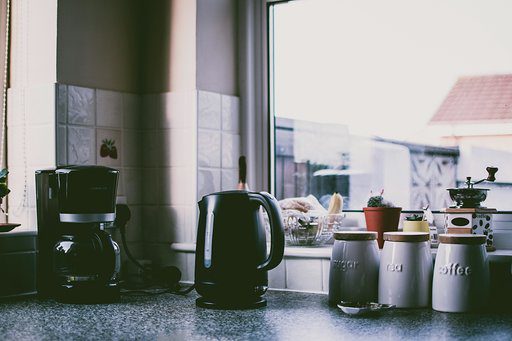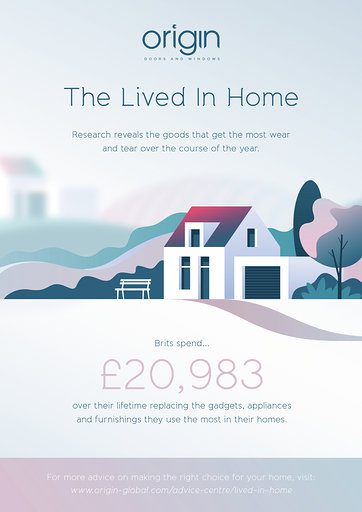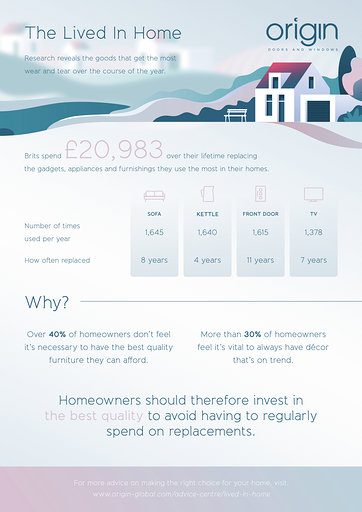Homeowners in Wales spend £17,679 over their lifetime replacing the gadgets, appliances and furnishings they use the most in their homes, according to new research.
From small electrical goods like the kettle, which is boiled a whopping 1,690 times per year, to larger pieces of furniture, such as the living room sofa, which homeowners in the region sit on over 1,667 times during the same time period, residents are spending a small fortune replacing the goods they use the most day-to-day.
 The research, conducted by Origin, the leading British window and door brand, reveals the goods that get the most wear and tear over the course of the year and therefore where homeowners in Wales should invest in the best quality to avoid having to regularly spend on replacements.
The research, conducted by Origin, the leading British window and door brand, reveals the goods that get the most wear and tear over the course of the year and therefore where homeowners in Wales should invest in the best quality to avoid having to regularly spend on replacements.
The kitchen kettle is the most used furnishing in the home, closely followed by the front door, which is opened and closed 1,678 times per year. It also takes an extra battering during family rows, as more than one third (36 percent) of those living in the region admit to slamming it when emotions run high. The TV (used 1,315 times), a favourite armchair (used 992 times), the wardrobe (used 690 times) and the cooker (used 661 times), also make the list.
The study also investigated how often Brits upgrade each gadget, appliance and piece of furniture. This revealed that many homeowners have a ‘throwaway’ attitude to home goods. Small electrical items, such as a kettle and toaster, are generally replaced every four years, while larger, more expensive items, such as a new sofa or armchair, are upgraded as frequently as every nine years.
When the rate of replacement is analysed alongside how much homeowners are willing to spend on each of the top ten most used objects in the home, it sets the combined replacement costs at almost £17,679 over the lifetime of the average Welsh homeowner. This is actually £1,579 less than the next nearest region.
For example, homeowners are willing to spend £29 on a new kettle, according to the research. A replacement every four years means that they will buy nearly 15 throughout their lifetime – spending over £435 on this essential kitchen gadget alone.
Ben Brocklesby, Director at Origin, said: “We were interested to find out which goods and furnishings in the home are put through their paces on a daily basis, and therefore where homeowners can actually save money in the long run by buying better quality. By making a simple change in looking out for products with guarantees over and above the industry standard, particularly when replacing the most used items in their property, they can be reassured that their goods will stand the test of time.”
 According to the national research, only a third of residents believe sustainability is important when buying new furniture and pieces for their home. A quarter prefer to buy cheaper home items so that they can be regularly replaced, while 28 percent admit to replacing things when they look worn, even if they still work properly.
According to the national research, only a third of residents believe sustainability is important when buying new furniture and pieces for their home. A quarter prefer to buy cheaper home items so that they can be regularly replaced, while 28 percent admit to replacing things when they look worn, even if they still work properly.
Ben Brocklesby continues: “As a nation, we need to be more aware of the effect our buying decisions have, not just on our own wallets, but also the environment. In fashion, the concept of a ‘capsule’ wardrobe has been applied to help support this way of thinking. Consumers buy fewer clothes but invest in high quality brands they can wear again and again, getting more cost per wear. This is something we all now need to consider when we buy and replace items in the home, particularly those we use most often.”
Despite this throwaway trend for items used the most, older items, particularly those that hold a sentimental value, play a pivotal part in what makes a house a home. Over 60 percent say it’s important for a home to contain signs it’s lived in, while the same number believe that a ‘lived in’ home is more homely. Nearly 40 percent value furniture that holds sentimental value.
Imperfections, such as worn chairs and marks on the walls, are what makes a house a home for more than a quarter of homeowners (26 percent). The same number feel that they grow a sentimental attachment to furniture and home items the longer they are owned. In fact, 68 percent of those asked hold an emotional attachment to a home furnishing, including their favourite mug (32 percent), glassware (18 percent) or a much-loved armchair (10 percent).
Ben Brocklesby continues: “There were some surprising results in terms of the sentimental value of items. This grows over time, so the longer we own something, the more it becomes an important factor in turning bricks and mortar into somewhere we consider our home.”
As well as being the third most used item in the home, a quarter of British homeowners believe the front door is a pivotal part of what makes a house a home, and over half feel it is an important part of their family residence.
Ben Brockelsby concludes: “We supply thousands of high-quality doors to homeowners up and down the country each year, so know from experience the important part a front door plays in a family’s life. It’s where many pivotal moments take place, from stepping out for our first day of school and where we traditionally cross the threshold when starting married life, to a place where we greet and say goodbye to our nearest and dearest. It’s therefore important to invest in one that will stand the test of time.”
The 10 Most Used Items in the Home
- Kitchen kettle – used 1,690 times per year
- Front door – used 1,678 times per year
- Sofa – used 1,667 times per year
- TV – used 1,315 times per year
- Armchair – used 992 times per year
- Wardrobe – used 690 times per year
- Cooker – used 661 times per year
- Microwave – used 551 times per year
- Washing machine – used 434 times per year
- Toaster – used 366 times per year
Origin has given advice to homeowners on how they can choose more sustainable, cost effective items for their homes. For more information, please visit https://origin-global.com/advice-centre/Lived-In-Home.
Help keep news FREE for our readers
Supporting your local community newspaper/online news outlet is crucial now more than ever. If you believe in independent journalism, then consider making a valuable contribution by making a one-time or monthly donation. We operate in rural areas where providing unbiased news can be challenging. Read More About Supporting The West Wales Chronicle



























